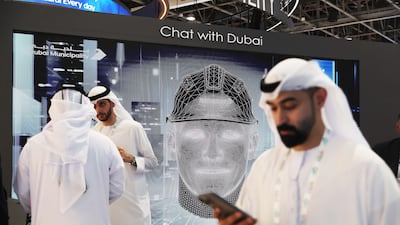Executives in the Middle East consider climate change to be the top priority for their companies in the coming year, prompting an increase in investments towards sustainability efforts, a study from Deloitte shows.
About 43 per cent of regional executives ranked climate change as their main focus, ahead of economic outlook (41 per cent) and geopolitical uncertainty (36 per cent), all higher than global averages, the London-based consultancy said in the 2024 CxO Sustainability Report, presented at Gitex Global in Dubai on Monday.
"It needs to be recognised that [the Middle East] is coming from way behind. But as it is in the region, we want to accelerate ... that's why it's starting to be incorporated into more and more strategies," Daniel Gribbin, director for sustainability at Deloitte, told The National.
Companies in the region have faced "significant pressure" from various stakeholders to act on climate change, which is slightly lower compared with the global average. They also receive similar levels of pressure from shareholders, competitors and banks, aligning closely with global trends, the report found.
Investments in sustainability are being held back by concerns about greenwashing, a form of misleading and deceptive conduct involving environmental, social or ethical claims to entice the market to purchase products or services, or to attract investment, Mr Gribbin said.
"There is funding available from financial institutions, governments are making leaps and bounds in investments, but there needs to be a sort of an internal drive to [make organisations] want to take this leap," he added. "At the moment, there's potentially a fear of failure or a fear of overpromising that can hold some companies back, and with that I think comes the awareness, the regulatory environment and various other things we will see to sort of help grow that going forward."
Meanwhile, the adoption of new innovations including artificial intelligence, ranks sixth, at 31 per cent, in the Deloitte report. That is lower than the global average of 38 per cent. That can be attributed to the knowledge gap and the practical applications of AI, Mr Gribbin said.
"About a decade ago, no one really knew how to implement, how to measure, or how to monitor ESG [environmental, social and governance] ... that can be compared a little bit to AI at the moment," he said. "There are some practicalities, but there's a bit of a general misunderstanding about how this will enable you to get to your end position whether that be in sustainability, data or various other solutions."
Technology geared towards climate change has steadily grown as countries and industries around the world work together to reach sustainability goals.
Nations in the Middle East have increased efforts as part of their commitments. For example, the UAE last October launched Waste to Zero, a global initiative that aims to advance decarbonisation efforts in waste management and the circular economy, as part of the country's aim to achieve net zero by 2050. Oman, meanwhile, plans to sell only zero-emission cars by 2050, which represents a significant step towards sustainability in the region, analysts told The National.
Deloitte said there was "still more to do" in the Middle East to help push the sustainability agenda forward, and to take advantage of investments made to achieve the goals.
"We need to keep pushing ourselves. We need to do it beyond just a minimum level of compliance and we need to grow and bring in those new business opportunities to capture new markets, mitigating some of these sustainability risks," Mr Gribbin added.


